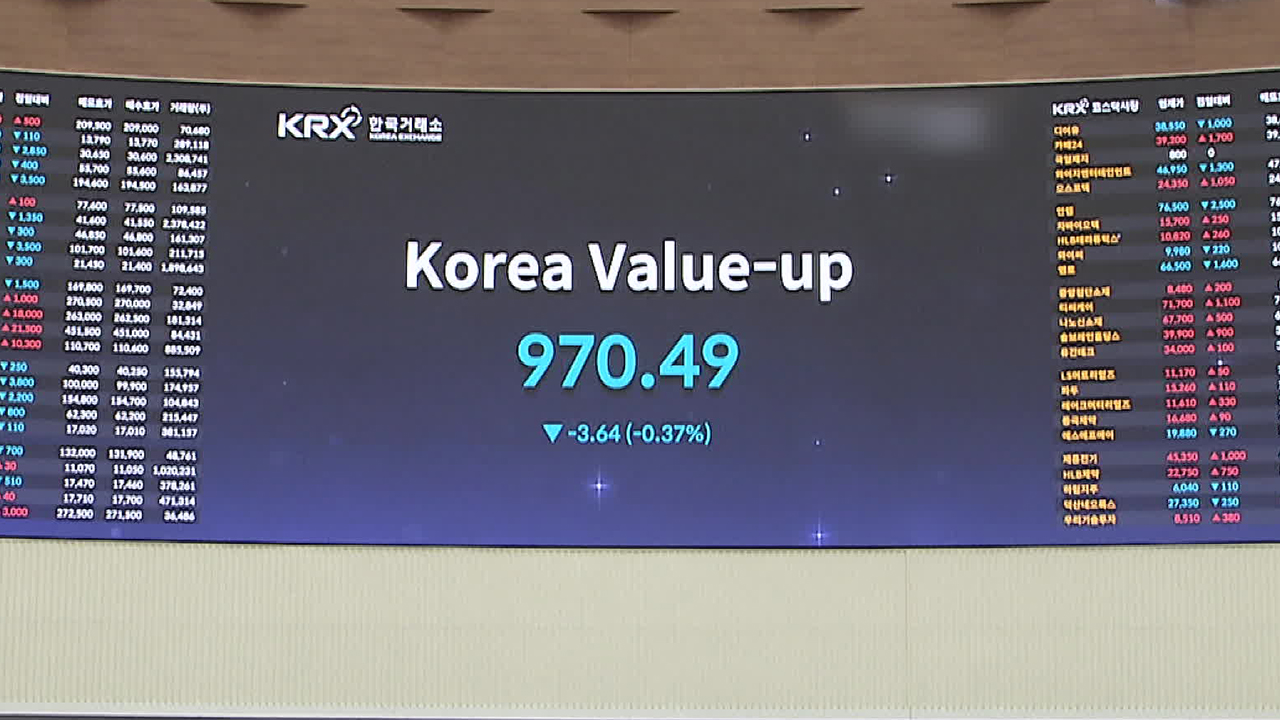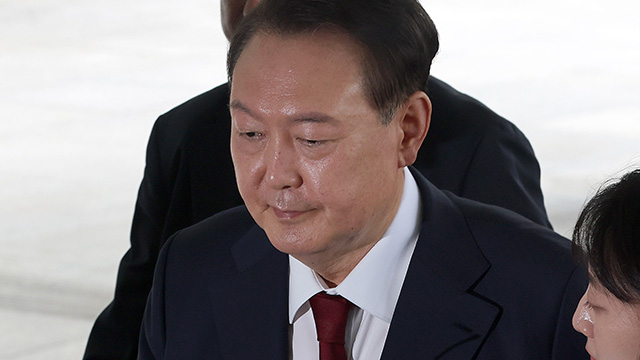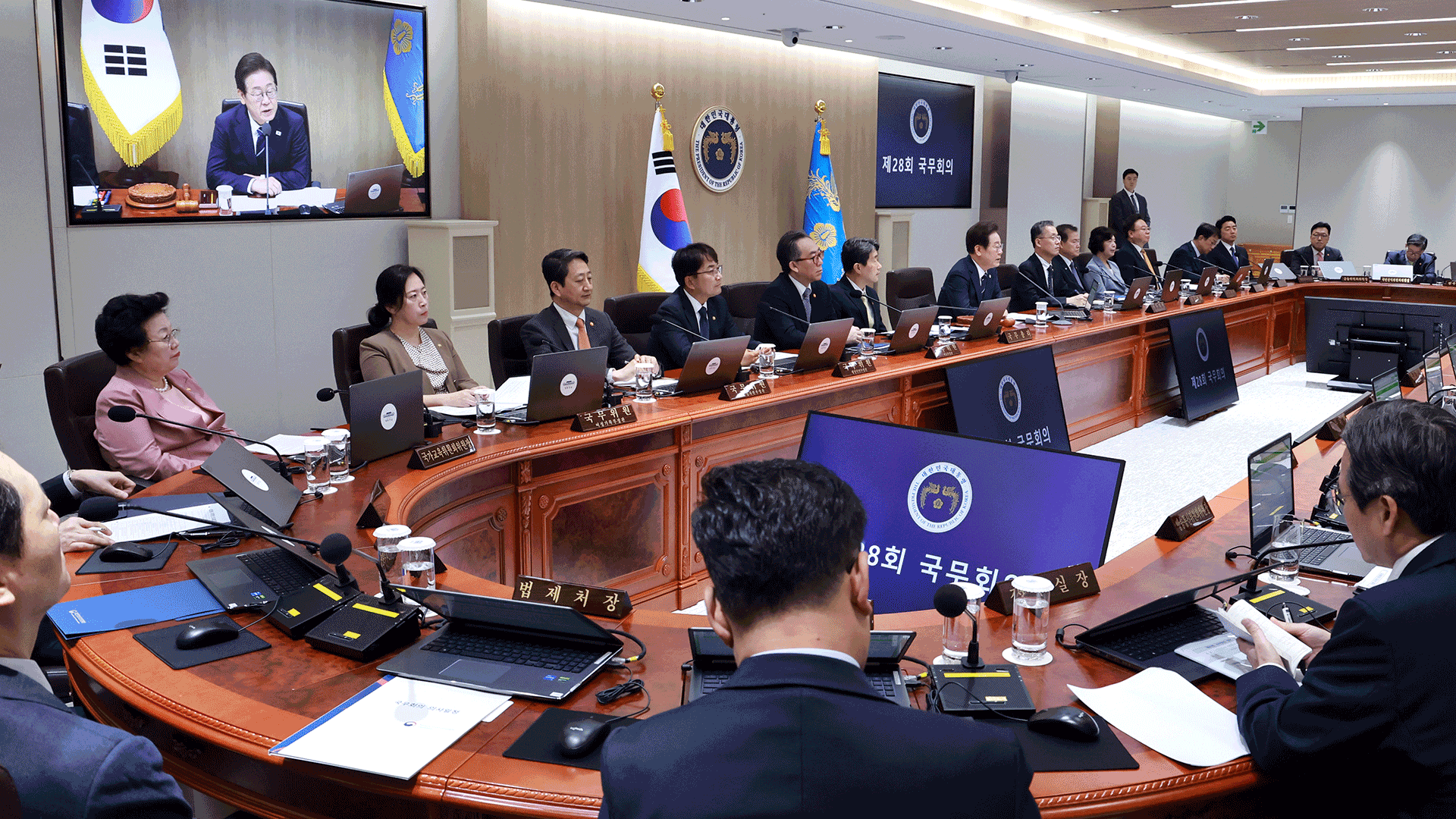[Anchor]
There is one more reason why the value-up is merely superficial.
Corporate participation is very low.
There are no carrots to entice participation, nor whips to apply pressure.
Continuing with reporter Kim Ji-sook.
[Report]
The core goal of value-up program is to protect 'retail investors', but Samsung Electronics, which has the most individual shareholders, is not participating.
Even though the Korea Exchange has repeatedly encouraged participation, there has been no response.
Among the top 10 groups, three, including Hanwha and GS, are employing a 'passing' and ignoring strategy.
The key policy of 'value-up' program is the expansion of shareholder dividends.
It is a pressure for companies to share more of their profits with shareholders, but from the company's perspective, there is nothing immediate in return.
Thus, a bill to reduce corporate taxes for companies that increase dividends was proposed, but it was scrapped due to disagreements between the ruling and opposition parties.
[Park Il-jun/Vice Chairman of the Korea Chamber of Commerce and Industry/Last December: "We conducted a survey of 1,300 citizens to see what is urgent for value-up, and about 70% of the responses were to prioritize changes to the tax system related to stock investment."]
Korea's 'Kakao' and America's 'Meta'.
While both are national representative SNS companies, their listing statuses are completely different.
Meta has only one parent company listed.
In contrast, Kakao is listed separately for games, payments, and banking.
The profits earned by lower platforms are reflected in Meta's stock price, benefiting its shareholders, but Kakao's shareholders do not enjoy such effects.
A revision of the Commercial Act is being pushed to prevent such 'spinoff listings' and 'fragmented listings' by the board of directors, but it is being blocked by the backlash from the business community.
[Hwang Se-woon/Senior Researcher at Korea Capital Market Institute: "'Fragmented listings' are all decided by the board of directors. (If the Commercial Act is revised) it will change to a situation where they will feel considerable pressure in making decisions that could harm general shareholders."]
In the end, there is neither a whip nor a carrot for value-up.
Only 3% of domestic listed companies have made easy 'value-up disclosures'.
This is KBS News, Kim Ji-sook.
There is one more reason why the value-up is merely superficial.
Corporate participation is very low.
There are no carrots to entice participation, nor whips to apply pressure.
Continuing with reporter Kim Ji-sook.
[Report]
The core goal of value-up program is to protect 'retail investors', but Samsung Electronics, which has the most individual shareholders, is not participating.
Even though the Korea Exchange has repeatedly encouraged participation, there has been no response.
Among the top 10 groups, three, including Hanwha and GS, are employing a 'passing' and ignoring strategy.
The key policy of 'value-up' program is the expansion of shareholder dividends.
It is a pressure for companies to share more of their profits with shareholders, but from the company's perspective, there is nothing immediate in return.
Thus, a bill to reduce corporate taxes for companies that increase dividends was proposed, but it was scrapped due to disagreements between the ruling and opposition parties.
[Park Il-jun/Vice Chairman of the Korea Chamber of Commerce and Industry/Last December: "We conducted a survey of 1,300 citizens to see what is urgent for value-up, and about 70% of the responses were to prioritize changes to the tax system related to stock investment."]
Korea's 'Kakao' and America's 'Meta'.
While both are national representative SNS companies, their listing statuses are completely different.
Meta has only one parent company listed.
In contrast, Kakao is listed separately for games, payments, and banking.
The profits earned by lower platforms are reflected in Meta's stock price, benefiting its shareholders, but Kakao's shareholders do not enjoy such effects.
A revision of the Commercial Act is being pushed to prevent such 'spinoff listings' and 'fragmented listings' by the board of directors, but it is being blocked by the backlash from the business community.
[Hwang Se-woon/Senior Researcher at Korea Capital Market Institute: "'Fragmented listings' are all decided by the board of directors. (If the Commercial Act is revised) it will change to a situation where they will feel considerable pressure in making decisions that could harm general shareholders."]
In the end, there is neither a whip nor a carrot for value-up.
Only 3% of domestic listed companies have made easy 'value-up disclosures'.
This is KBS News, Kim Ji-sook.
■ 제보하기
▷ 카카오톡 : 'KBS제보' 검색, 채널 추가
▷ 전화 : 02-781-1234, 4444
▷ 이메일 : kbs1234@kbs.co.kr
▷ 유튜브, 네이버, 카카오에서도 KBS뉴스를 구독해주세요!
- Low participation in value-up
-
- 입력 2025-01-18 00:20:26

[Anchor]
There is one more reason why the value-up is merely superficial.
Corporate participation is very low.
There are no carrots to entice participation, nor whips to apply pressure.
Continuing with reporter Kim Ji-sook.
[Report]
The core goal of value-up program is to protect 'retail investors', but Samsung Electronics, which has the most individual shareholders, is not participating.
Even though the Korea Exchange has repeatedly encouraged participation, there has been no response.
Among the top 10 groups, three, including Hanwha and GS, are employing a 'passing' and ignoring strategy.
The key policy of 'value-up' program is the expansion of shareholder dividends.
It is a pressure for companies to share more of their profits with shareholders, but from the company's perspective, there is nothing immediate in return.
Thus, a bill to reduce corporate taxes for companies that increase dividends was proposed, but it was scrapped due to disagreements between the ruling and opposition parties.
[Park Il-jun/Vice Chairman of the Korea Chamber of Commerce and Industry/Last December: "We conducted a survey of 1,300 citizens to see what is urgent for value-up, and about 70% of the responses were to prioritize changes to the tax system related to stock investment."]
Korea's 'Kakao' and America's 'Meta'.
While both are national representative SNS companies, their listing statuses are completely different.
Meta has only one parent company listed.
In contrast, Kakao is listed separately for games, payments, and banking.
The profits earned by lower platforms are reflected in Meta's stock price, benefiting its shareholders, but Kakao's shareholders do not enjoy such effects.
A revision of the Commercial Act is being pushed to prevent such 'spinoff listings' and 'fragmented listings' by the board of directors, but it is being blocked by the backlash from the business community.
[Hwang Se-woon/Senior Researcher at Korea Capital Market Institute: "'Fragmented listings' are all decided by the board of directors. (If the Commercial Act is revised) it will change to a situation where they will feel considerable pressure in making decisions that could harm general shareholders."]
In the end, there is neither a whip nor a carrot for value-up.
Only 3% of domestic listed companies have made easy 'value-up disclosures'.
This is KBS News, Kim Ji-sook.
There is one more reason why the value-up is merely superficial.
Corporate participation is very low.
There are no carrots to entice participation, nor whips to apply pressure.
Continuing with reporter Kim Ji-sook.
[Report]
The core goal of value-up program is to protect 'retail investors', but Samsung Electronics, which has the most individual shareholders, is not participating.
Even though the Korea Exchange has repeatedly encouraged participation, there has been no response.
Among the top 10 groups, three, including Hanwha and GS, are employing a 'passing' and ignoring strategy.
The key policy of 'value-up' program is the expansion of shareholder dividends.
It is a pressure for companies to share more of their profits with shareholders, but from the company's perspective, there is nothing immediate in return.
Thus, a bill to reduce corporate taxes for companies that increase dividends was proposed, but it was scrapped due to disagreements between the ruling and opposition parties.
[Park Il-jun/Vice Chairman of the Korea Chamber of Commerce and Industry/Last December: "We conducted a survey of 1,300 citizens to see what is urgent for value-up, and about 70% of the responses were to prioritize changes to the tax system related to stock investment."]
Korea's 'Kakao' and America's 'Meta'.
While both are national representative SNS companies, their listing statuses are completely different.
Meta has only one parent company listed.
In contrast, Kakao is listed separately for games, payments, and banking.
The profits earned by lower platforms are reflected in Meta's stock price, benefiting its shareholders, but Kakao's shareholders do not enjoy such effects.
A revision of the Commercial Act is being pushed to prevent such 'spinoff listings' and 'fragmented listings' by the board of directors, but it is being blocked by the backlash from the business community.
[Hwang Se-woon/Senior Researcher at Korea Capital Market Institute: "'Fragmented listings' are all decided by the board of directors. (If the Commercial Act is revised) it will change to a situation where they will feel considerable pressure in making decisions that could harm general shareholders."]
In the end, there is neither a whip nor a carrot for value-up.
Only 3% of domestic listed companies have made easy 'value-up disclosures'.
This is KBS News, Kim Ji-sook.
-
-

김지숙 기자 vox@kbs.co.kr
김지숙 기자의 기사 모음
-
이 기사가 좋으셨다면
-
좋아요
0
-
응원해요
0
-
후속 원해요
0















이 기사에 대한 의견을 남겨주세요.